2011 年四川省内江市中考英语真题及答案
本试卷分会考卷(选择题)和加试卷(非选择题)两大部分。会考卷第 1 至 6 页,满
分 100 分;加试卷第 7 至 10 页,满分 60 分。全卷满分 160 分,120 分钟完卷。
注意事项:
1、答卷前,考生务必将自己的姓名、准考证号、考试科目、试卷类型用铅笔涂写在答
题卡上。
2、会考卷(选择题)1-70 小题,每小题选出答案后,用铅笔把答题卡上对应题目的答
案标号涂黑。如需改动,用橡皮擦擦干净后,再选涂其它答案标号。
3、加试卷的各小题用钢笔或圆珠笔直接答在试卷上。
4、考试结束后,监考人员将答题卡和试卷一并收回。
会考卷(共三部分,100 分)
第一部分 听力部分(共两节,满分 30 分)
答题时,先将答案划在试卷上。录音内容结束后,你将有两分钟的时间将试卷上的答
案转涂到答题卡上。
第一节(共 5 小题;每小题 1.5 分,满分 7.5 分)
听下面 5 段对话,每段对话后有一个小题,从题中所给的 A、B、C 三个选项中选出最
佳选项,并标在试卷的相应位置。听完每段对话后,你都有 10 秒钟的时间来回答有关小题
和阅读下一小题。每段对话读两遍。
1. What are the speakers going to do tomorrow?
A. To watch TV.
B. To go sightseeing.
C. To go
hiking.
2. Which comes from
France
?
A. The T-shirt.
B. The sweater.
C. The dress.
3. What would the woman like to do?
A. To play basketball.
B. To play tennis.
C. To play volleyball.
4. Who will have an English test ?
A. Lucy.
B. Lily.
C. The man.
5. What was the boy doing this morning?
A. He was listening to music.
学科 网(北 京)股 份有限 公司
�
B. He was cleaning his house.
C. He was visiting his friends.
第二节(共 15 小题;每小题 1.5 分,满分 22.5 分)
听下面 4 段对话或独白。每段对话或独白后有几个小题,从题中所给的 A、B、C 三个
选项中选出最佳答案,并标在试卷的相应位置。听每段对话或独白前,你将有时间阅读各
小题,每个小题 5 秒钟;听完后,各个小题将给出 5 秒钟的作答时间。每段对话或独白读
两遍。
听第 6 段材料,回答第 6 至第 8 三个小题。
6. Which country did Grandpa visit?
A. Japan.
B. France.
C. England.
7. How long did Grandpa spend on the plane?
A. 90 hours.
B. 9 hours.
C. 19 hours.
8. What does Grandpa think of the city?
A. Nice.
B. Old.
C. Bad.
听第 7 段材料,回答 9 至第 11 三个小题。
9. The man wants to go to
.
A. the nearest street
B. Jiangbei Airport
C. the bus stop
10. How long will it take the man to get there on foot?
A. About half an hour.
B. About twenty minutes.
C. About forty minutes.
11. Which bus can the man take?
A. The No. 30 bus.
B. The No. 32 bus.
C. The No. 23
bus.
听第 8 段材料,回答第 12 至第 15 四个小题。
12. What is the man?
A. A doctor. B. A student.
C. A businessman.
13. What will the man do tomorrow evening?
A. Visit his Grandma. B. Visit his Grandpa. C. Visit his parents.
14. When does the party begin on Saturday evening?
A. At 5:30.
B. At 8:30.
C. At 7:30.
15. Where will they meet?
A. In KFC.
B. In the man’s house.
C. In the woman’s house.
学科 网(北 京)股 份有限 公司
�
听第 9 段材料,回答第 16 至第 20 五个小题。
16. What does Li Hua do?
A. A student.
B. A teacher.
C. A shop assistant.
17. How does Li Hua go to school every day?
A. On foot.
B. By bus.
C. By car.
18. What did the thief take from the old lady?
.
A. Her money.
B. Her bag.
C. Her ID card.
19. How did Li Hua help the lady?
A. She fought against the thief.
B. She called the police.
C. She caught the man in the shop.
20. How is Li Hua?
A. Kind and friendly.
B. Weak but helpful.
C. Brave and clever.
第二部分
基础知识运用(共两节,满分 30 分)
第一节
单项选择(共 20 小题,每小题 1 分,满分 20 分)
从各题所给 A、B、C 三个选项中,选出可以填入题内空白处的正确答案,并在答题卡上
将该项涂黑。
21. My birthday is coming. Dale will send me
A. a
C. the
B. an
e-dog as my birthday present.
22. A big earthquake hit
Japan
the afternoon of March 11th, 2011.
A. in
B. on
C. at
23. Go on with your English study.
is difficult if you put your heart into
it.
A. Anything
B. Something
C. Nothing
24. —I have trouble learning math this term.
—You should pay more
to your teacher’s advice.
A. money
B. attention
C. time
25. I like the MP3,
it’s too expensive.
A. but
26. —
B. so
C. and
do you speak English so well?
—Because I practice it with my partner every day.
学科 网(北 京)股 份有限 公司
�
A. Why
B. When
C. Who
27. —What a hot day!
—The weather report says it will be much
tomorrow.
A. hot
B. hotter
C. hottest
28. —
you
the film Gongfu Panda Ⅱ?
— Not yet. I’ll see it this Sunday.
A. Did, see
B. Do, see
C. Have, seen
29 —You are always talking about your pet cat. What does it look like?
—
.
A. It likes fish
B. It’s small and white
C. It likes playing
with me
30. Last night Dad and Mum didn't come back home
A. while
C. until
B. if
I finished my homework.
31. — Hello. May I speak to Tom?
— Yes.
.
A. Speaking, please
B. I’m Tom
C. My name is Tom
32. Every year driving after drinking wine
a lot of traffic accidents.
A. happens
B. provides
33. — Which scarf do you prefer?
C. causes
-— The red one. It
more comfortable.
A. tastes
B. feels
C.
gets
34. — Your classroom is really bright and clean.
— It
after school every day.
A. is cleaned
B. cleaned
C.
was cleaned
35. I’m going to start a club to help students
are not interested in
schoolwork.
A. whose
B. who
C.
whom
36. Remember to
your mobile phone when the plane takes off.
A. turn on
B. turn down
C. turn off
37. Teachers often tell us
in the river after school.
A. don’t swim
B. not swim
C. not to swim
38. —Must I be home before eight o’clock, Mum?
— No, you
. But you have to come back before ten o’clock.
A. needn’t
B. can’t
C. mustn’t
学科 网(北 京)股 份有限 公司
�
39. — Could you tell me
Zhang
Daqian
Museum
?
—The day after tomorrow, I think.
A. when will you visit
C. when you would visit
40. —Excuse me, may I sit here?
B. when you will visit
—
. The girl on the seat will return soon.
A. Yes, please
B. I’m afraid not
C. No, thanks
第二节 完形填空(共 10 小题,每小题 1 分,满分 10 分)
阅读下面短文,从短文后所给各题的 A、B、C 三个选项中,选出可以填入空白处的最佳选
项,并在答题卡上将该项涂黑。
One Friday night, a poor young man stood at the train station. He played his
violin and many people put 41
into the hat in front of him.
The next day, the young man came to the station 42
. But this time he took
out a large piece of paper
43
some words on it. It said “Last night a lady 44
Mrs Sang put an important thing into my hat
45
. Please come for it.”
After about an hour, a middle-aged woman ran to the young man in a hurry and
said, “You do come here. I know that you’re a(n) 46
man and will certainly come
here.” They had a talk and the young man made sure she was the owner. Then he took
out a lottery ticket and
47
it to the woman. Her husband bought a lottery ticket
every day. Yesterday when she knew the lottery ticket he bought won, she was very
48
. The prize of the lottery ticket was $ 500,000. When she walked past the young
man, she took out $50 and put it in the hat.
49
, the lottery ticket was also
thrown in.
Later, someone asked the young man, “You play the violin every day to make
money. Why didn’t you just take the prize of the lottery ticket for yourself?”
the young man said,“Although I don’t have much money, I live happily. But if I
50
honesty, I won’t be happy forever.”
41. A. money
B. tickets
C. paper
42. A. instead
B. differently
C. again
43. A. for
B. with
C. over
44. A. introduced
B. spelled
C. named
45. A. by mistake
B. for mistake
C. on mistake
学科 网(北 京)股 份有限 公司
�
46. A. crazy
B. cool
C. honest
47. A. gave
B. lent
C. offered
48. A. surprising
B. happy
C. exciting
49. A. But
B. However
C. Therefore
50. A. have
B. win
C. lose
第三部分 阅读理解(共 20 小题,每小题 2 分,满分 40 分 )
阅读下列短文,从每题所给的 A、B、C 三个选项中,选出最佳选项,并在答题卡上将该项
涂黑。
A
For children
Museum: Children’s Museum, Sundays,
89 North Street
, 67641235
Story time: Children’s Library,
106 Green Street
, Wednesdays
during 9:30 a.m.-----5:00p.m., 66599624
Sports: Soccer Club, Tuesday and Thursday,
16 Yangtze Road
,
96725643
Basketball Club, Wednesdays and Fridays, 79071632
Cinema: New movies for children, on weekends,
99 Brick Road
,
69001354
Useful Phone numbers
Fast Food Restaurant: 66387901
Hospital: 68787451
Visitor
Information
Center
: 800-120-9847
Taxi: 79210583
Visitor Hotel Information:800-739-7302
51.Where is the Children’s Museum?
A. 106 Green Street
B.
16 Yangtze Road
C.
89 North Street
52. It’s Wednesday, you can go to
.
A. play basketball
B. play soccer
C. see a movie
学科 网(北 京)股 份有限 公司
�
53. If children want to order fast food, they should call
.
A. 66387901
B. 79210583
C. 68787451
54. If you dial 79210583, you can
.
A. do some shopping
B. have a good story time
C. call a taxi
55. There is no information about
in the two notices.
A. looking for a hotel
B. doing eye exercises
C. seeing a doctor
B
Do you plan to go to Hong Kong Disneyland with your family this summer? If your dad
smokes, you may have to ask him to be careful. From January 1st, Hong Kong banned
(禁止)smoking in most public places.
These places include restaurants, workplaces, schools and so on. Even smoking
in some outdoor places is not allowed, for example, beaches, sports ground, museums
and most areas of public parks.
Hong Kong
hopes the ban can stop passive smoking. What is passive smoking?
When people smoke in a restaurant or on a bus, others have to smoke too. They don’t
want to smoke but they have no choice. This is passive smoking. It is bad for people’s
health.
And it’ll be better if more people in
Hong Kong
give up smoking because
of the ban. Jack Lee, a 26-year-old student says, “The ban is really good. I don’t
like people smoking next to me. It’s so smoky and smelly.”
If someone breaks the ban, he will be fined HK$5,000.
Hong Kong
is not the first Asian city to have a smoking ban. On January 1,
2006,
Singapore
banned smoking in most public places.
56.Smoking is not allowed
in
Hong Kong .
A. in indoor places
B. in most public places
C. at home
57.Which outdoor place is not mentioned in the passage?
A. The park
B. The beach
C. The airport
58. What’s the purpose of the smoking ban in
Hong Kong
?
A. To stop passive smoking.
学科 网(北 京)股 份有限 公司
�
B. To stop the sale of cigarettes.
C. To stop people from smoking.
59.The example in Paragraph 4 shows (证明)that
.
A. Jack Lee likes smoking very much
B. people in
Hong Kong
support the
ban
C. Jack Lee is used to smoking
60.What’s the Chinese meaning of the underlined word “fined”?
A. 罚款 B. 给予 C. 奖励
C
What’s a blog? A blog is a personal online diary(日记). It’s cool, it’s hot,
and everyone is doing it. People talk about it often. Sound like a fashion? In fact,
It’s another trend (流行趋势). And the word “blogger” means a person who writes
diaries online. Are you a blogger?
Many bloggers are teenagers who log (进入) onto websites to discuss anything in
their lives. Many of today’s teenagers are not afraid to openly discuss everything
in their lives. Teenagers complain about their parents and homework. They share
diaries, post(发布) songs from the latest bands and show pictures of theirs. They
write their own poems, say something about their girlfriends or boyfriends and
complain to each other or offer support. But mostly they just write down what they
do every day.
However, many parents are worried about these young bloggers. Parents see the
kids talking about how they got drunk last weekend and how they don’t like studying.
They are using the language that is surprising to their parents. Besides hearing
from their friends, teen bloggers also get messages from strangers. Most of the time,
it’s older men asking to meet teenage girls. “These strange men are dangerous for
my kids. They sometimes teach my kids bad words.” said Cara Cabral, a mother of
two children.
Many teenagers and young adults know it’s not safe to use blogs on the Internet.
They know they are putting information about themselves in a place where it can be
seen by anyone. But teenagers are unwilling to give up these new communication tools
that have become a way of life for many of them.
C. the blog
61. The underlined word “it” in the first paragraph means ________.
B. the Internet
A. the fashion
62. Which of the following is NOT TRUE?
A. Teenagers don’t tell about their personal life in their blogs.
B. Teenagers mostly write down what they do every day in their blogs.
C. Teenagers complain about their parents and homework in their blogs.
63. What’s the main idea of the third paragraph?
A. Many parents don’t understand kids’ language in their blogs.
B. Many parents are worried about these young bloggers.
C. Many parents can understand why their kids don’t like studying.
学科 网(北 京)股 份有限 公司
�
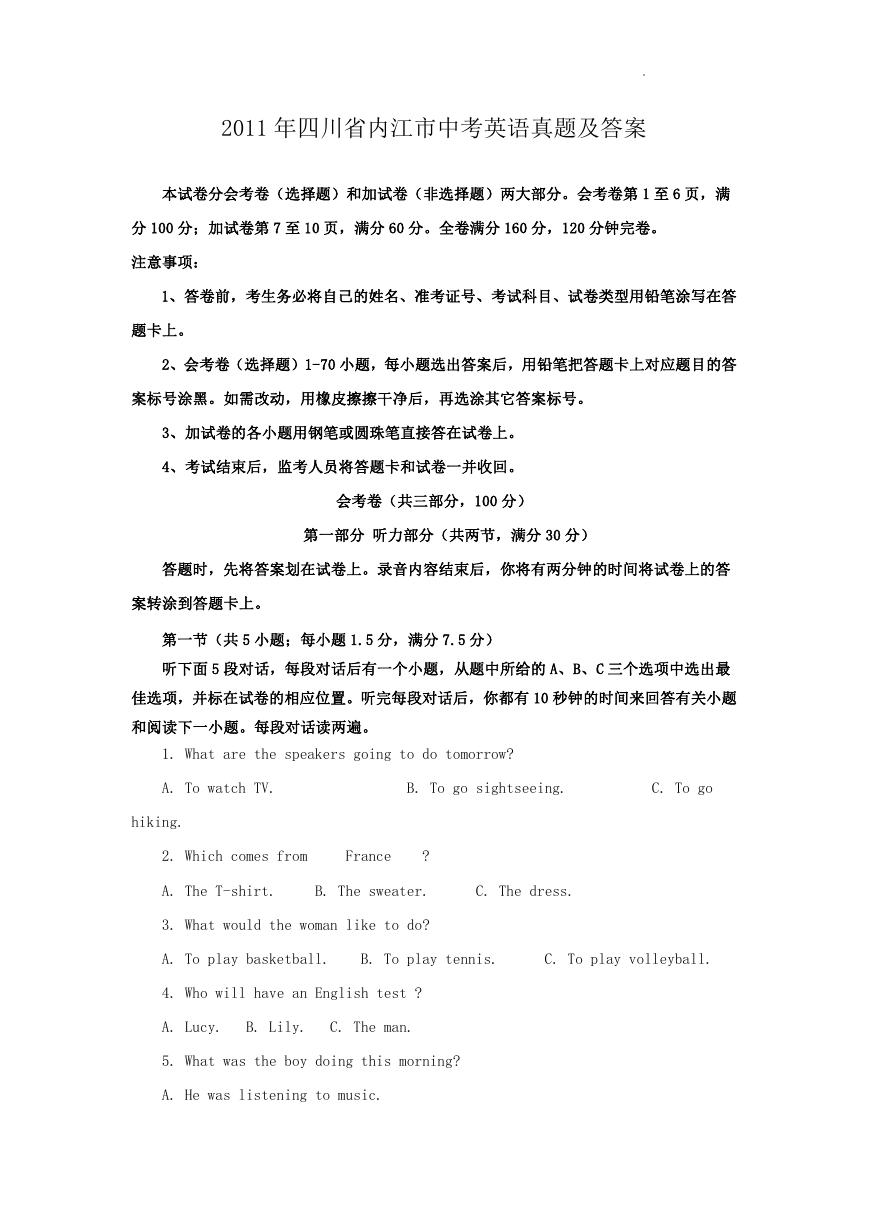

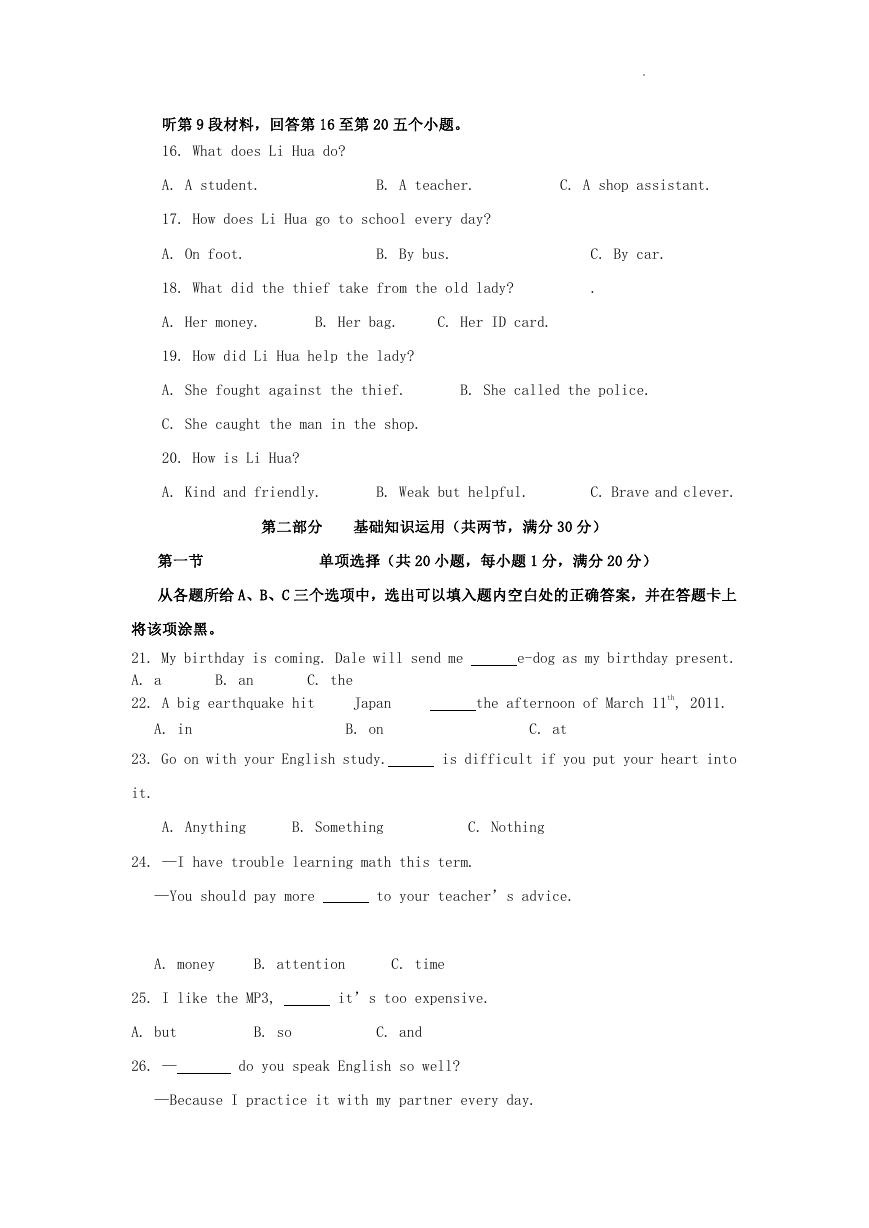

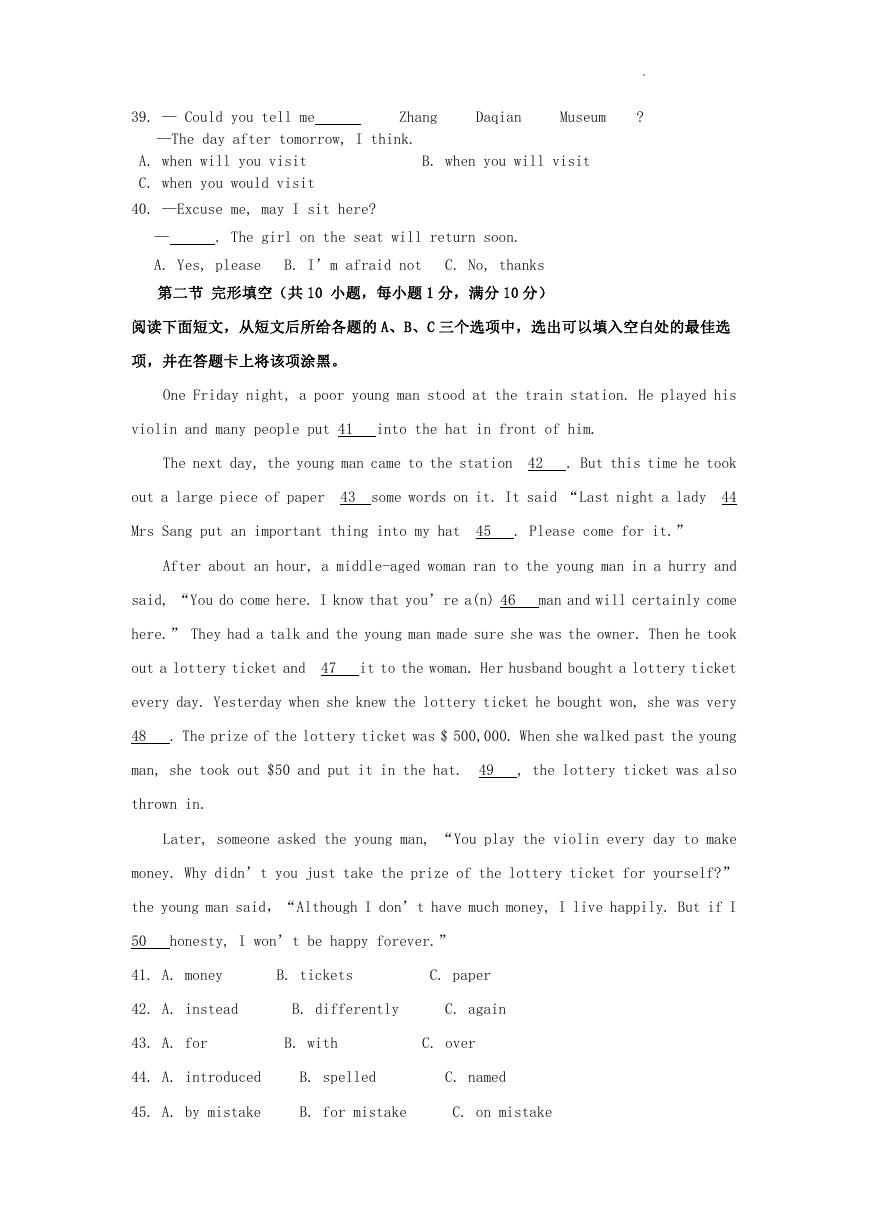
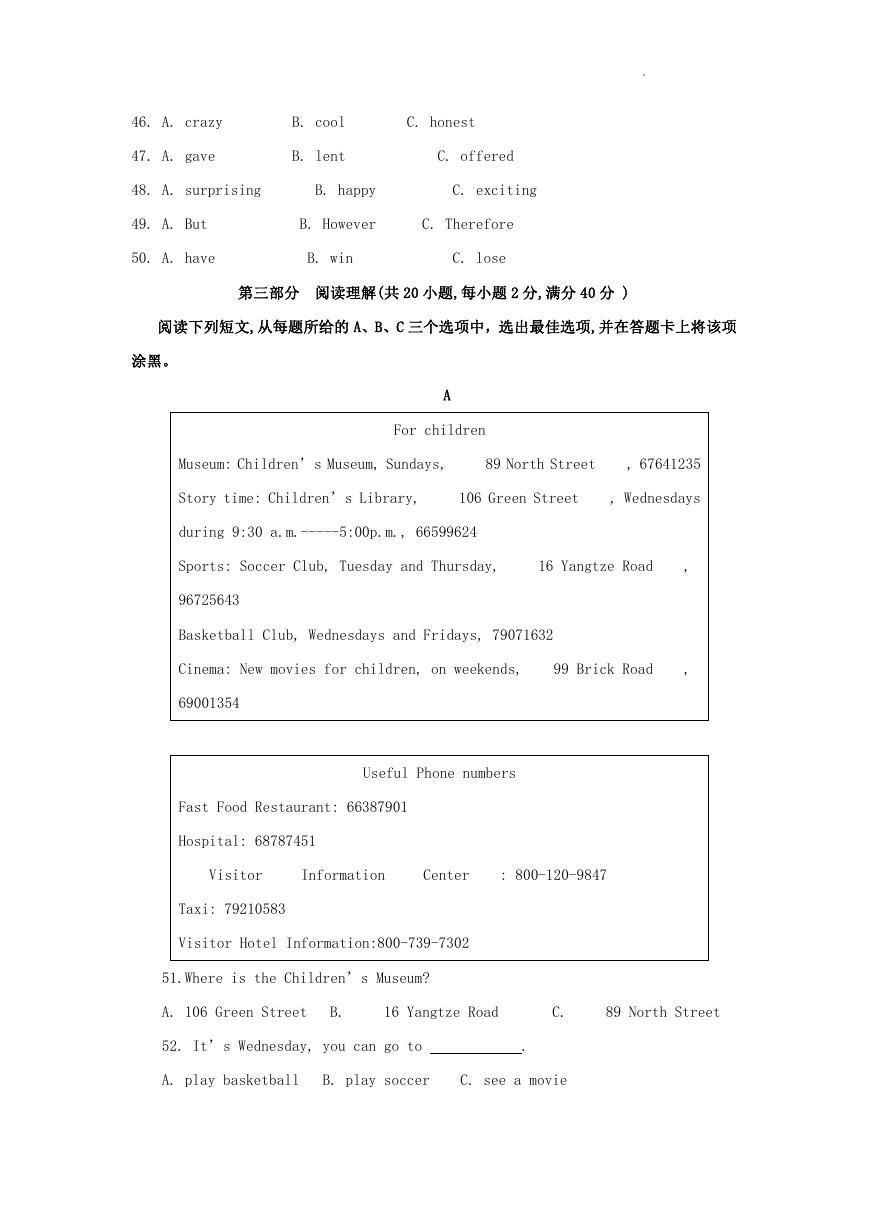
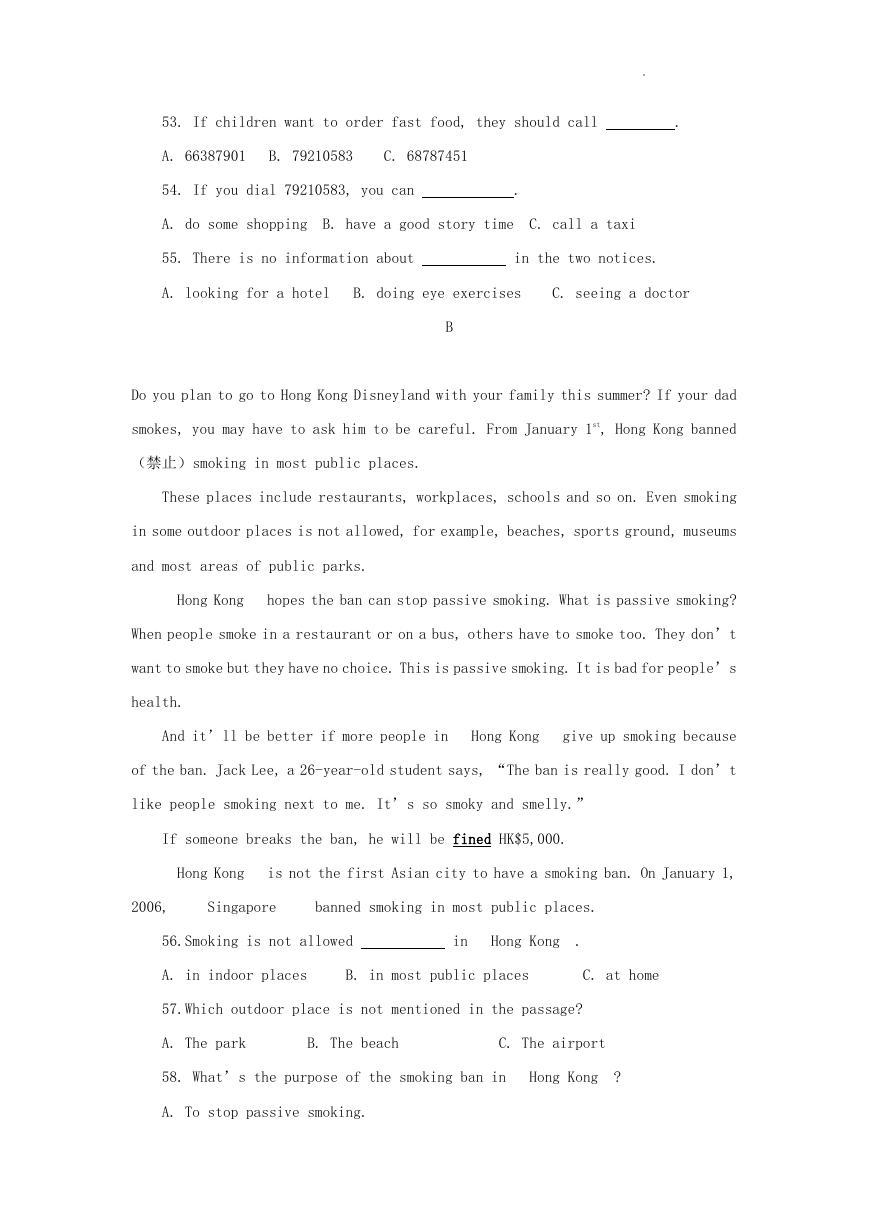









 2023年江西萍乡中考道德与法治真题及答案.doc
2023年江西萍乡中考道德与法治真题及答案.doc 2012年重庆南川中考生物真题及答案.doc
2012年重庆南川中考生物真题及答案.doc 2013年江西师范大学地理学综合及文艺理论基础考研真题.doc
2013年江西师范大学地理学综合及文艺理论基础考研真题.doc 2020年四川甘孜小升初语文真题及答案I卷.doc
2020年四川甘孜小升初语文真题及答案I卷.doc 2020年注册岩土工程师专业基础考试真题及答案.doc
2020年注册岩土工程师专业基础考试真题及答案.doc 2023-2024学年福建省厦门市九年级上学期数学月考试题及答案.doc
2023-2024学年福建省厦门市九年级上学期数学月考试题及答案.doc 2021-2022学年辽宁省沈阳市大东区九年级上学期语文期末试题及答案.doc
2021-2022学年辽宁省沈阳市大东区九年级上学期语文期末试题及答案.doc 2022-2023学年北京东城区初三第一学期物理期末试卷及答案.doc
2022-2023学年北京东城区初三第一学期物理期末试卷及答案.doc 2018上半年江西教师资格初中地理学科知识与教学能力真题及答案.doc
2018上半年江西教师资格初中地理学科知识与教学能力真题及答案.doc 2012年河北国家公务员申论考试真题及答案-省级.doc
2012年河北国家公务员申论考试真题及答案-省级.doc 2020-2021学年江苏省扬州市江都区邵樊片九年级上学期数学第一次质量检测试题及答案.doc
2020-2021学年江苏省扬州市江都区邵樊片九年级上学期数学第一次质量检测试题及答案.doc 2022下半年黑龙江教师资格证中学综合素质真题及答案.doc
2022下半年黑龙江教师资格证中学综合素质真题及答案.doc